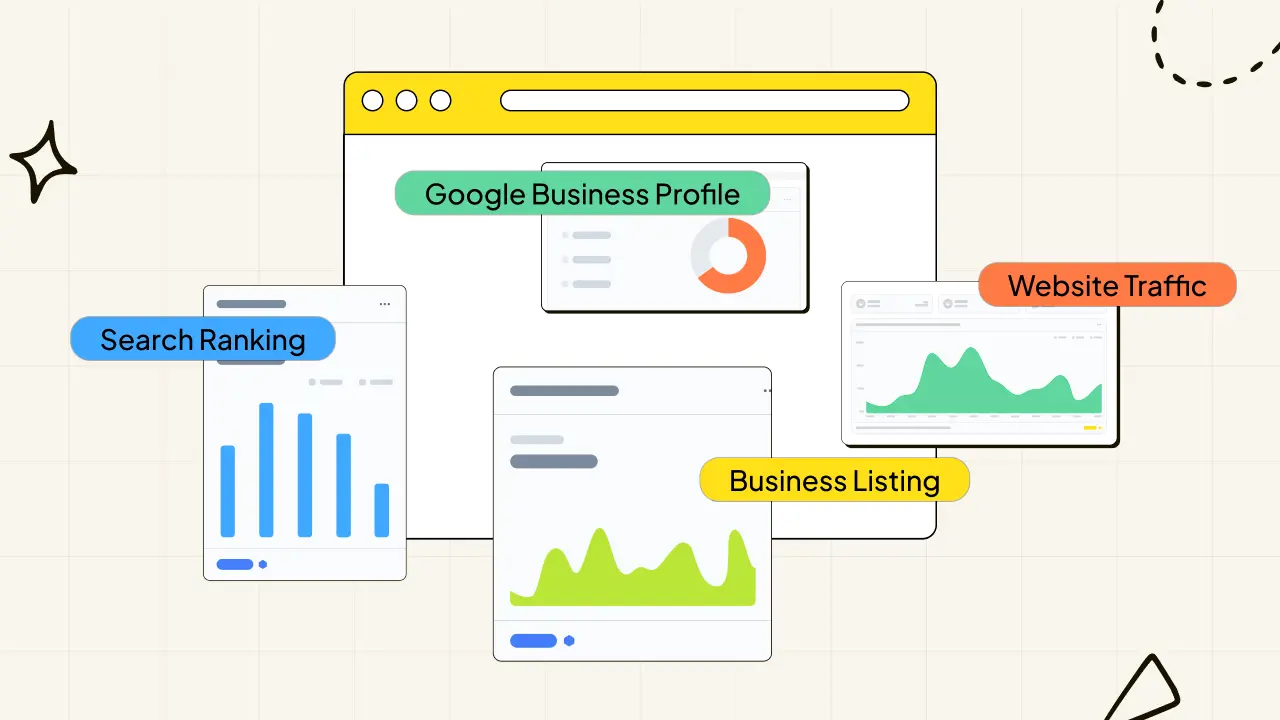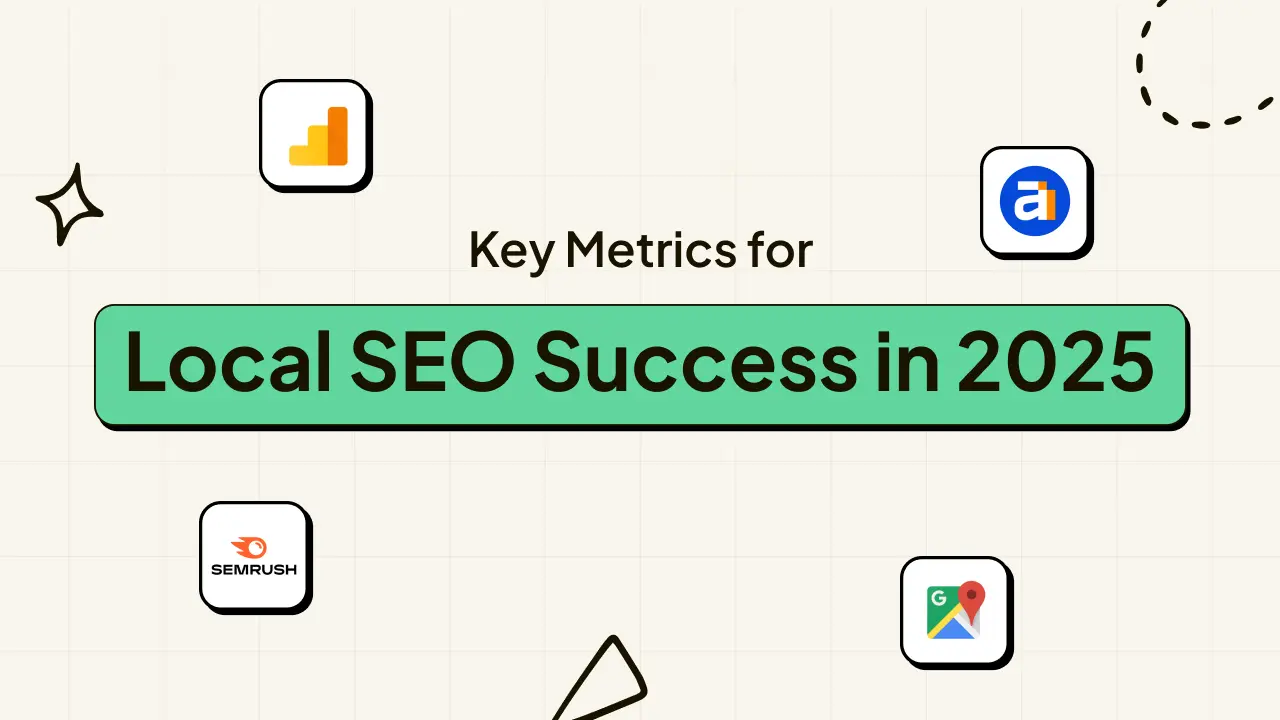

Reliable data pipeline and warehouse.

Prefetched data for faster loads.

Supports Looker Studio, BigQuery and more.

Legacy Reportdash Platform.

Data fetched on demand.

Export to Google Sheets or Looker Studio.

Running a local business in 2025 means competing online for customers in your neighbourhood. Whether you own a restaurant, dental office, or retail store, you need to know how well your business shows up when people search for what you offer.
This guide will show you the key metrics for local SEO success that actually matter. We'll keep it simple and focus on numbers that help you get more customers walking through your door.
Why Track Local SEO Metrics?
Think of local SEO metrics like checking your business's health. Just like you'd check sales numbers or customer count, tracking your online performance tells you what's working and what isn't.
Without tracking local SEO success, you're guessing. You won't know if your local SEO efforts are bringing in customers or wasting your time.
Here's what happens when you track the right metrics for local SEO:
You see which online activities bring real customers
You know what potential customers want from your business
You can fix problems before they hurt your business
You prove that your local SEO strategy actually works
Now let's look at where most of your local customers find you first.
Google Business Profile: Your Online Front Door

Your Google Business Profile is often the first thing people see when they search for your business name or services. It's like your online storefront window - it needs to look good and give people what they need.
Understanding Your Profile Performance
Google gives you free data about how people interact with your business listing. This shows you exactly how many people find you, click on your website, or ask for directions. This information helps you understand your local customers better.
Key things to watch:
How many people see your listing - This tells you if you're visible in local search results
What people search for to find you - These are your most important local keywords
Actions people take - Website clicks, direction requests, and phone calls
Photo views - Whether your pictures attract local visitors
Direction Requests Matter Most
If you need people to visit your physical location, direction requests are gold. When someone clicks "Get Directions," they're planning to visit you. This is one of the best metrics for local SEO because it directly leads to customers.
To get more direction requests:
Use clear, attractive photos of your storefront
Keep your hours updated
Make your location easy to find
Give people good reasons to visit
Getting found is important, but you also need to know where you rank when people search.
Your Search Rankings: Where Do You Show Up?
Your local search rankings determine how many people see your business. If you don't show up on the first page of search results, most potential customers won't find you.
Average Rank Position: Your Report Card
This metric tells you where your business appears for specific local keywords. If you're a pizza place in Chicago, you want to know where you rank when someone searches "pizza near me" or "Chicago pizza delivery."
Why this matters for local seo performance:
Shows which local keywords work for you
Helps you find opportunities to improve rankings
Tracks your progress over time
Reveals busy seasons for your business
Focus on tracking these search terms:
Your main service + your city name
"Near me" searches for your business type
Local keywords your customers actually use
Searches for your business name
But ranking high means nothing if people don't trust your business. That's where reviews come in.
Customer Reviews: Your Online Reputation
Google pays close attention to customer reviews when deciding local pack rankings. Reviews also help potential customers decide whether to choose your business over competitors.
Quality and Quantity Both Matter
You need both good reviews and lots of them. Many positive reviews show that your business is popular and trustworthy. But even one or two detailed, helpful reviews can convince someone to visit.
Here's what to track:
Total number of reviews across all platforms
Average star rating (aim for 4.0 or higher)
How often you get new reviews each month
How quickly you respond to customer feedback
Where your reviews appear - Google search, Yelp, Facebook, etc.
Fresh Reviews Get More Attention
New reviews matter more than old ones. People trust recent customer feedback because it shows your current service quality. Plus, Google search sees regular reviews as a sign that your business is active.
To get steady reviews:
Ask satisfied customers to leave reviews
Respond to all reviews professionally
Make it easy for people to review you
Fix problems that cause negative reviews
Now let's look at exactly which numbers you should track.
The Key Metrics You Need to Watch
Here are the specific metrics for local SEO that will help your business grow:
Google Business Profile
Profile Views: How many people saw your listing
Website Clicks: People who visited your website
Direction Requests: Customers planning to visit you
Phone Calls: Direct calls from your listing
Message Inquiries: Questions sent through your profile
Search Ranking
Average Position: Where you rank for important local keywords
Local Pack Ranking: Your spot in the top 3 local results
Click-Through Rate: How many people click when they see you
Search Visibility: How often you appear for relevant searches
Review
Total Reviews: Overall count across all sites
Average Stars: Your overall rating
New Reviews Per Month: How many fresh reviews you get
Response Rate: Percentage of reviews you reply to
Review Sources: Which platforms have your reviews
Website Traffic
Local Visitors: People from your area visiting your site
Mobile Traffic: Visitors using phones and tablets
Conversion Rate: Visitors who become customers
Local Page Performance: How well your location pages work
Business Listing
Directory Listings: How many sites list your business
Information Accuracy: Whether your business name, address, and phone match everywhere
Duplicate Listings: Incorrect listings that confuse customers
These numbers give you a complete picture of your local seo performance.
How to Start Tracking
Don't try to track everything at once. Start simple and add more metrics as you learn what matters most for your business.
Step 1: Set Up the Basics
Make sure your Google Business Profile is complete and accurate. This gives you the most important data about local customers for free.
Step 2: Know Your Starting Point
Write down where you are now:
Current search rankings for your main local keywords
How your Google Business Profile performs
Your review count and average rating
Current website traffic from local searches
Step 3: Check Regularly
Pick a schedule and stick to it. Check your key metrics weekly or monthly to spot trends and problems early.
Step 4: Focus on What Needs Work
Use your data to find the biggest problems first. Low direction requests? Improve your profile. Poor rankings? Work on your local keywords and citations.
Simple Tools to Get Started
You don't need expensive software to start tracking local seo success. Begin with free tools and upgrade as you grow.
Free Tools That Work
Google Business Profile: Shows how people interact with your listing
Google Analytics: Tracks website visitors from local searches
Google Search Console: Shows your search rankings and performance
Google Maps: See how you appear to local customers
Paid Tools for Serious Tracking
BrightLocal: Complete local seo tracking
Moz Local: Manages your business listings
SEMrush: Advanced keyword and ranking tracking
Ahrefs: Deep keyword research and competitor analysis
Review Management Tools
ReviewTrackers: Monitor reviews across platforms
Podium: Get more reviews and respond to customers
Reputation.com: Full reputation management
Start with free tools, then invest in paid ones when you're ready to scale your local seo efforts.
Advanced Tracking for Growth
Once you master the basics, these metrics can give you an edge over competitors:
Voice Search Tracking
How people find you through voice searches
Performance for conversational local search queries
Featured snippet appearances
Mobile Performance
Mobile vs desktop visitor behavior
How well mobile visitors convert to customers
Mobile page loading speed impact
Competitor Analysis
How visible you are compared to competitors
Local keywords where competitors beat you
Quality comparison of local backlinks
Customer Journey Tracking
Complete path from search to purchase
Online searches that lead to store visits
Long-term value of customers from local searches
These advanced metrics help you understand the complete customer experience and find new growth opportunities.
Making It All Work Together
The best approach combines all these metrics into a simple system you can manage. Focus on the numbers that directly connect to more customers and more revenue.
Remember: tracking metrics only helps if you use the information to make improvements. Check your numbers regularly, but spend most of your time on actions that improve your local seo performance.
Start with your Google Business Profile, work on getting positive reviews, and track your progress with simple tools. As you get more comfortable, add advanced tracking and expand your local seo strategy.
Conclusion
Local seo success in 2025 comes down to tracking the right metrics and taking action based on what you learn. You don't need to be a technical expert - you just need to pay attention to the numbers that matter.
The biggest challenge? Keeping track of all your data in one place. Checking Google, your website, review sites, and other platforms takes forever and gets confusing fast.
That's where simple tracking tools help. Tools like ReportDash Datastore pull all your important numbers together automatically. Instead of logging into five different websites, you see everything on one screen. You can spot problems faster and know exactly what's working.
Start with the basics: fix your Google Business Profile, get more reviews, and watch your key numbers. As you see results, consider using tools that make tracking easier. ReportDash Datastore offers a 14-day free trial at ReportDash DataStore if you want to see how much time automated tracking can save you.
The businesses winning in local search track their numbers consistently and fix problems quickly. While your competitors guess what works, you'll know for sure.
Start tracking these key metrics for local SEO success today. Whether you use free tools or try automated platforms, the important thing is to start measuring, keep improving, and watch more local customers choose your business.


